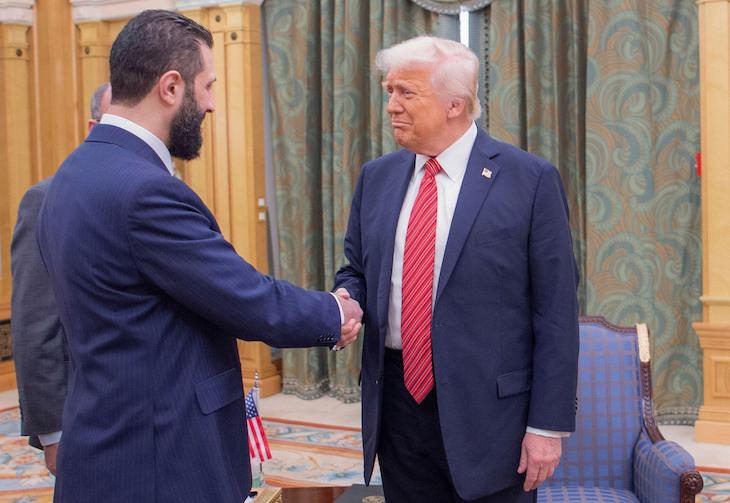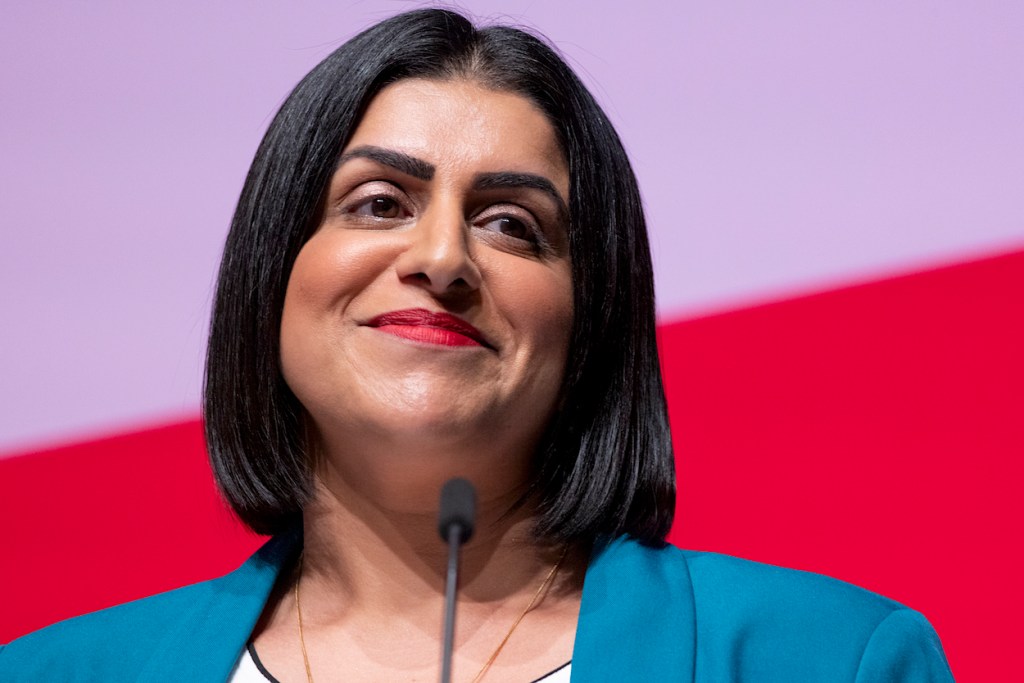It’s an image that would have been shocking, even a few months ago: US president Donald Trump shaking hands with Ahmed al-Sharaa, formerly Abu Muhammad al-Jolani, a fighter for al-Qaeda in Iraq, imprisoned by the Americans, now interim president of Syria.
Getting sanctions lifted is the greatest achievement of al-Sharaa’s presidency so far
The pair met in Riyadh, the capital of Saudi Arabia, alongside their respective foreign minsters, for 33 minutes, the Syrian presidency said. Saudi Crown Prince Mohammed bin Salman was there too; Turkey’s president Erdogan joined them on the phone.
Before their meeting, Trump announced in a speech yesterday that he would remove all economic sanctions on Syria to give the country a chance at ‘greatness.’ Ever since the fall of the Assad regime in December, Syrians have campaigned for this moment. The former regime, against whom the sanctions were directed, is gone. What use is there keeping the economic pressure on a new government, a nation reborn?
Syria’s economic situation is grim. A third of all the buildings in the country were destroyed in 14 years of civil war. Syria has a cash crisis because the former regime did not print or spread enough Syrian pounds, which have also plummeted in value. Electricity and food is cripplingly expensive; and much of the economy now turns out to have been inefficient government work for people close to the now-defeated Ba’ath party. The Ba’ath party was a great leech on the Syrian economy. It is now gone. But the patient has lost a lot of blood. Recovery will take a lot of time and care.
After the announcement that sanctions would be lifted, the value of Syrian currency on international markets almost doubled.
Trump said that his conditions for Syria’s continued relief from sanctions are the defeat of Isis elements within the country (the new government and the United States are already working together very closely on this subject); for Damascus to take responsibility for camps and prisons currently controlled by the Syrian Democratic Forces (SDF) in the north; and he wants Syria to build closer diplomatic relations with Israel.
This latter condition will be a test for Syria’s government: Israel has invaded and occupied some of the Syrian south. “The IDF (Israeli Defence Forces) is prepared to stay in Syria for an unlimited amount of time,” Israel Katz, the country’s defence minister, has said. Will Syria’s leadership come to an agreement that means Israeli troops pull out? Or will they have to turn a blind eye to this situation?
Whatever happens next, meeting Trump and – if this occurs – getting sanctions lifted is the greatest achievement of al-Sharaa’s presidency so far.
That doesn’t, of course, mean that his troubles are over. Far from it. Syria is still far from united. In the north, there are tensions between the autonomous areas governed by the SDF (Syrian Democratic Forces) and the new government. An interim deal has been signed by both parties, but it has yet to go into serious, sustained effect.
Al-Sharaa’s ministers are overworked and lack levers to affect policy. The whole country needs deep reform. Nurtured by the former regime, Isis exists in the eastern deserts, not yet defeated. Syria’s president will need to cooperate with other regional powers to ensure that Isis is formally destroyed and can never rise again from its internal exile. This will take many years.
Likewise, a Syrian state must be built in a place where before there was only hollowness and failure. For over a decade, militias roamed Syria, operating lawlessly, changing their allegiances periodically. The militias, those that fought for the Assad regime and others armed and funded by Turkey which helped defeat that regime, must be broken up. The state must hold a monopoly on the use of force.
All of these are difficult tests. Al-Sharaa may not be up to them. The job may be an impossible one. But this photo-call with a US president – and the lifting of sanctions – is something many thought would never come; the Americans had been obstinate for some time when many other countries, including Britain, forged ahead with sanctions relief. If the sanctions are indeed lifted, Syria may yet have a chance of survival.







Comments